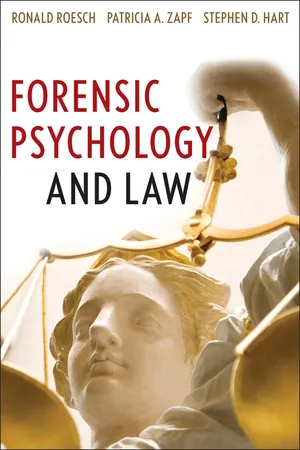
- English
- ePUB (mobile friendly)
- Available on iOS & Android
Forensic Psychology and Law
About this book
"In Forensic Psychology and Law, three internationally known experts provide exceptional coverage of a wide array of topics that address both the clinical applications of forensic psychology and the role of psychological science in understanding and evaluating legal assumptions and processes."
—Norman Poythress, PhD, Research Director and Professor, Louis de la Parte Florida Mental Health Institute, Dept. of Mental Health Law and Policy
"Forensic Psychology and Law is a major contribution to the teaching of law and psychology. Roesch, Zapf, and Hart offer a timely, comprehensive, and succinct overview of the field that will offer widespread appeal to those interested in this vibrant and growing area. Outstanding."
—Kirk Heilbrun, PhD, Professor and Head, Department of Psychology, Drexel University
"In this volume, three noted experts have managed to capture the basic elements of forensic psychology. It is clearly written, well organized, and provides real world examples to hold the interest of any reader. While clarifying complex issues, the authors also present a very balanced discussion of a number of the most hotly debated topics."
—Mary Alice Conroy, PhD, ABPP, Psychological Services Center, Sam Houston State University
A Comprehensive, Up-to-Date Discussion of the Interface Between Forensic Psychology and Law
Forensic Psychology and Law covers the latest theory, research, and practice in the field and provides thought-provoking discussion of topics with chapters on:
- Forensic assessment in criminal and civil domains
- Eyewitness identification
- Police investigations, interrogations, and confessions
- Correctional psychology
- Psychology, law, and public policy
- Ethics and professional issues
Frequently asked questions
- Essential is ideal for learners and professionals who enjoy exploring a wide range of subjects. Access the Essential Library with 800,000+ trusted titles and best-sellers across business, personal growth, and the humanities. Includes unlimited reading time and Standard Read Aloud voice.
- Complete: Perfect for advanced learners and researchers needing full, unrestricted access. Unlock 1.4M+ books across hundreds of subjects, including academic and specialized titles. The Complete Plan also includes advanced features like Premium Read Aloud and Research Assistant.
Please note we cannot support devices running on iOS 13 and Android 7 or earlier. Learn more about using the app.
Information
Chapter 1
INTRODUCTION TO PSYCHOLOGY AND LAW: Civil and Criminal Applications
CHAPTER OBJECTIVES
- The definition of forensic psychology
- The history of forensic psychology
- The varied roles that forensic psychologists play
- The professional associations and publications relevant to forensic psychologists
- The structure of the legal system
- The similarities and differences in the fields of psychology and law
- The training opportunities for students who wish to pursue a career as a forensic psychologist
Box 1.1 On Criminal Profiling
DEFINING FORENSIC PSYCHOLOGY
To return to my original question about what is forensic psychology, I believe that there are two levels of classification that yield two sets of definitions. At the level of ethical guidelines and professional responsibility, the broad definition fits best. Any psychologist (clinical, social, cognitive, developmental, etc.) who works within the legal system is a forensic psychologist in this sense, and the same high ethical and professional standards should apply to all. When it comes to how the legal system and the public conceptualize forensic psychology, however, there is a definite clinical flavor. The clinical/nonclinical distinction is a meaningful one, I believe. For example, educational, training, and licensing issues that are pertinent to clinical forensic psychologists may be irrelevant or inapplicable to nonclinical forensic psychologists. Further, clinicians and nonclinicians differ in their orientation to the legal process and in the role that they are likely to play in the courtroom (e.g., individual assessments vs. research-based social fact evidence). So there you have it—two varieties of forensic psychologists, clinical and nonclinical. (Brigham, 1999, p. 295)
| American Board of Forensic Psychology (2007) | Forensic psychology is the application of the science and profession of psychology to questions and issues relating to law and the legal system. The word forensic comes from the Latin word forensis, meaning “of the forum,” where the law courts of ancient Rome were held. Today, forensic refers to the application of scientific principles and practices to the adversary process in which specially knowledgeable scientists play a role (http://www.abfp.com). |
| American Psychological Association (2001) | Forensic psychology is the professional practice by psychologists who foreseeably and regularly provide professional psychological expertise to the judicial system. Such professional practice is generally within the areas of clinical psychology, counseling psychology, neuropsychology, and school psychology, or other applied areas within psychology involving the delivery of human services, by psychologists who have additional expertise in law and the application of applied psychology to legal proceedings (http://www.apa.org/crsppp/archivforensic.html). |
| Goldstein (2003) | Goldstein “considers forensic psychology to be a field that involves the application of psychological research, theory, practice, and traditional specialized methodology (e.g., interviewing, psychological testing, forensic assessment, and forensically relevant instruments) to a legal question” (p. 4). Goldstein fur... |
Table of contents
- Cover
- Table of Contents
- Title
- Copyright
- Preface
- Acknowledgments
- Chapter 1: INTRODUCTION TO PSYCHOLOGY AND LAW: Civil and Criminal Applications
- Chapter 2: FORENSIC ASSESSMENT IN CRIMINAL DOMAINS
- Chapter 3: CIVIL FORENSIC ASSESSMENT
- Chapter 4: FORENSIC TREATMENT
- Chapter 5: EYEWITNESS IDENTIFICATION
- Chapter 6: POLICE INVESTIGATIONS, INTERROGATIONS, AND CONFESSIONS
- Chapter 7: JURIES AND LEGAL DECISION MAKING
- Chapter 8: JUVENILES IN THE LEGAL SYSTEM
- Chapter 9: POLICE PSYCHOLOGY
- Chapter 10: CORRECTIONAL PSYCHOLOGY
- Chapter 11: PSYCHOLOGY, LAW, AND PUBLIC POLICY
- Chapter 12: ETHICS AND PROFESSIONAL ISSUES
- Author Index
- Subject Index
- End User License Agreement